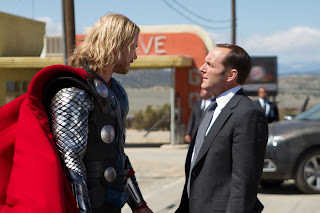 If you enter the blockbuster business in Hollywood, you essentially enter the $80 million opening weekend business. Which is to say, it’s part of a pray/hope/accept/die model. Considering most blockbusters cost $150-$200 million, with marketing sometimes adding up to $100 million, a 3x’s multiplier after an $80 million opening ($240 million) might be the best-case scenario, unless you‘ve released a much-better-than-expected film (not likely). You double that number with overseas receipts, you’ve potentially got $480-$500 million worldwide on a possible $300 million expenditure. The studio earns 55% of that take, meaning that you’ve approached profit, with DVD and merchandising expecting to take care of the rest.
If you enter the blockbuster business in Hollywood, you essentially enter the $80 million opening weekend business. Which is to say, it’s part of a pray/hope/accept/die model. Considering most blockbusters cost $150-$200 million, with marketing sometimes adding up to $100 million, a 3x’s multiplier after an $80 million opening ($240 million) might be the best-case scenario, unless you‘ve released a much-better-than-expected film (not likely). You double that number with overseas receipts, you’ve potentially got $480-$500 million worldwide on a possible $300 million expenditure. The studio earns 55% of that take, meaning that you’ve approached profit, with DVD and merchandising expecting to take care of the rest.
And so, the pray/hope/accept/die model. Most studios let their blockbuster out in the wild praying for $80 million +, and if tracking isn’t nearly as strong, they hope for $60 million, with the expectation that a 3x’s multiplier takes you to $180 million. $40 million is something you have to accept – yes, lots of people still saw your movie, and maybe a lot of them loved it. You could have word of mouth and strong legs, or you could even go supernova on DVD. A lot of things have to fall in place, and the film could still hit hard, but profit’s a longshot. Less than that? Death.
Marvel expected the final leg of marketing to take “Thor” to the level of “Iron Man,” but that never materialized, and even with inflation and a 3D surcharge, the opening weekend brought in $33 million less than the initial adventure of Tony Stark. International crowds have responded strongly to the God of Thunder, and a final tally of $400-$500 million is likely, though these two-week numbers aren’t strong enough to spark “Thor 2” talk at the Marvel offices. As such, consider the second week drop of less-than-50% to be only somewhat workable, as, unlike other summer blockbusters, “Thor” faced no direct competition. Not that it matters, anyway: in addition to the toys and cross-marketing strategies in place to ensure “Thor” profits, the character is already going to feature prominently in next summer’s “The Avengers.” Nobody is embarrassed by this, is a less-optimistic way of describing the situation.
Most people expected “Bridesmaids” to do middling-to-acceptable numbers, and few considered $20 million a likelihood. Like some of the reviews, most of this came from backwards thinking from both sexes. Nikki Finke claimed she would retire if “Bridesmaids” opened to more than $15 million, as if that was the benchmark for how many women would accept ladies behaving badly, despite only a few scenes in the film accurately capturing that vibe. Like most people, she forgot that the male-centric films produced by Judd Apatow, all of which feature significant humor based around various degrees of scatology, were heavily attended by women as well, and the nose-holding notion that women are repulsed by poop and fart jokes (cue Karina Longsworth’s wrongheaded take on the picture) does a lot to further encourage people to police the public, and private, behavior of women in this country.
The numbers aren’t strong enough to suggest that the film connected that strongly, and Kristin Wiig isn’t exactly on the A-List just yet, but this is a big win. “Bridesmaids” was actually within whistling distance of “Thor”’s per-screen average despite playing in a thousand less theaters, and, opening around the same level of “The 40 Year Old Virgin” the film could play for a bit and threaten $100 million. In other words, Ms. Finke, you have the prose of a twelve year old, the composure of someone much younger, and a commenting crowd that represents the biggest argument against politicians who claim America spends too much on education. You can retire now.
Congratulations to “Fast Five,” now the highest grossing film in the series domestically. And yet, worldwide, the film is demolishing the competition to the point where there will be a very sharp domestic/international divide between numbers. The third weekend hold wasn’t bad for this film, suggesting there were some repeat viewings, and that even with “Pirates Of The Caribbean” emerging next weekend, “Fast Five” could make a play for $200 million, and likely $500 million globally. Rarefied air – this is the first fourth sequel to be the highest-grossing in a franchise.
It remains perplexing that anyone allowed “Priest” to happen, though Hollywood politics clear up such questions. Director Scott Stewart, who debuted with last year’s smash-and-grab D-movie “Legion,” is actually the founder of The Orphanage, one of the biggest special effects houses in the industry. And so, as a small thank you, it only makes sense that Hollywood allow him to direct his middling sci-fi mashups with his Olivier, Paul Bettany, despite zero interest in “Priest” from even the most ardent genre fan boys. But this stuff works as more of an off-season treat then a big ticket May attraction, so it’s not a surprise that, even with a few 3D-buffered engagements, this debut didn’t match the $17 million January haul for “Legion.” Side note: this guy’s got some issues with religion.
The smallest audience drop in the top ten belongs to “Rio.” The Blue Sky ‘toon picked up an odd second wind as its box office run is slowing down, a surprising but not entirely unexpected development give that there are no other kiddie ‘toons until “Kung-Fu Panda 2” on the 26th. The film could stick around and even chase $150 million if it holds steady next weekend, though it will lose more 3D screens with “Pirates” arriving on our shores.
While “Jumping The Broom” handily out grossed “Something Borrowed” last weekend despite appearing on nearly a thousand less screens, it appears some course correction has occurred, with “Borrowed” only narrowly behind “Broom” at this point. The reason for this is simple: “Broom,” with it’s tired class-war romance concept, was a first weekend attraction for highly unadventurous filmgoers. “Borrowed” meanwhile, is actually based on a series of books, and a large portion of its audience (readers) are not the type to rush as soon as a movie opens. The fact that neither film appears to be any good is unfortunate. The fact that three female-centric wedding films should each pull in at least $35 million during the month of May is notable.
Modest success awaits “Water For Elephants,” which should cross $50 million sometime before next weekend. Meanwhile, “Madea’s Big Happy Family” became the seventh Tyler Perry offering to cross $50 million domestically. Not exactly Apatow territory but close. It was a limp to get to these numbers, however, and it’s a safe bet that’s the last we’ve seen of Madea for awhile, with Perry currently directing the more conventional romantic comedy “Good Deeds” before moving into blockbuster territory with “I, Alex Cross.” Still in the top ten after six weeks, “Soul Surfer” has hung on for one last hurrah, likely to close with a $40 million+ gross, about twice as much what anyone anticipated.
In indie theaters, the numbers were middling for “Everything Must Go.” The film only scored $740k with a 218 theater berth, averaging slightly above $3k per-screen. The news was also weak for “Hesher,” which tallied $127k at forty engagements, while “The Beaver” continued to struggle despite an expansion onto 105 screens, averaging $1.5k per-screen for a $158k second weekend tally.
The news was even less encouraging for Lionsgate’s “Go For It,” which earned the support of a 218 theater launch but only averaged $505 per-screen, landing at a dismal $110k for the weekend. National Geographic found slightly more success with “The First Grader,” nabbing $22.6k on three screens, but “Skateland” floundered with only $5.1k on two screens. The week’s biggest per-screen average belonged to “L’amour Fou,” which grabbed $36k worth of audiences at two locations. Lots of indies out there, lots of empty theaters. Support your local arthouse, boys and girls.
1. Space Viking 3D (Paramount) – $34.5 million ($119 mil.)
2. Judd Apatow, But For The Ladies! (Universal) – $24.4 million
3. Fast, To The Power Of Five (Universal) – $19.5 million ($169 mil.)
4. The Vengeful Clergyman 3D (Sony/Screen Gems) – $14.5 million
5. Rio 3D (Fox) – $8 million ($125 mil.)
6. Jumping The Broom (Sony/TriStar) – $7.3 million ($26 mil.)
7. Something Borrowed (Warner Bros.) – $7 million ($26 mil.)
8. Courvoisier For Elephants (Fox) – $4.1 million ($48 mil.)
9. Tyler Perry’s Madea Goes To Hell: The Final Friday (Lionsgate) – $2.2 million ($50 mil.)
10. Soul Surfer (Sony) – $1.8 million ($39 mil.)



